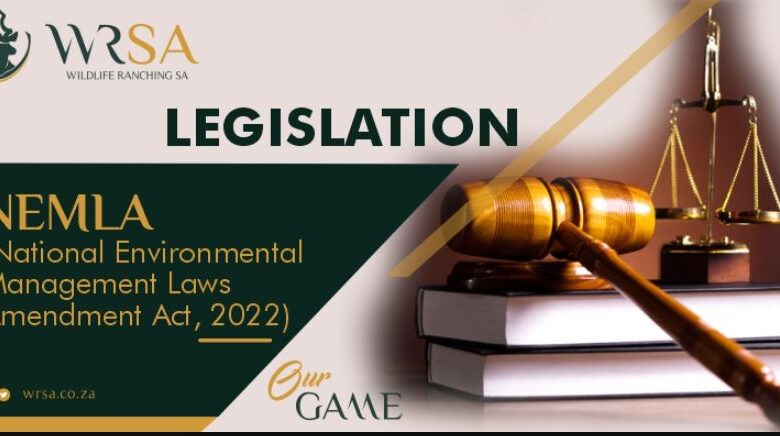National Environmental Management Act (NEMA) changes related to Section 24G – Controversial ammendment

BY; Luca Maraschin-Associate Mining and Environmental – NSDV
SECTION 24G-WHIZZ!
One of the many changes made to the National Environmental Management Act, 1998 (NEMA) by the National Environmental Management Laws Amendment Act, 2022 (NEMLA4) is the amendment of section 24G.
It’s a G-whizz moment for this controversial provision which provides for the so-called “ex post facto” authorisation for the commencement of a listed or specified activity without an environmental authorisation or the commencement, undertaking or conducting of a waste management activity without a waste management licence (collectively referred to as “unauthorised activity”).
NEMLA-Be4
Prior to the enactment of NEMLA4, the section 24G process broadly provided that the person who undertook the unauthorised activity would have to apply to the applicable Minister or MEC for “ex post facto” authorisation. The Minister or MEC was empowered to request, amongst other things, that the person compiles a report like an Environmental Impact Assessment for consideration. The Minister or MEC was also empowered to request that the person immediately ceases the unauthorised activity pending the decision on the application. It was also mandatory for the person to pay an administrative fine not exceeding R 5 million for commencing such an unauthorised activity. Upon the Minister’s or MEC’s consideration of the aforementioned report, the regulator could, among other things, issue or refuse to issue authorisation.
A STONE TO PICK
A criticism of this legislative mechanism was that it could enable opportunists to undertake unauthorised activities and then “seek forgiveness” for same at a later stage, because the offender could avoid delaying the project with the required environmental authorisation process, inclusive of the public’s participation therein. The administrative fines historically imposed by regulators were considered not to be an adequate deterrent for commencing or conducting an unauthorised activity and then later applying for authorisation in terms of section 24G.
However, NEMLA4 has brought about several changes to section 24G which appear to have broadened its applicability and addressed some of the criticisms raised against the provision.
HOW HAS NEMLA4 AMENDED SECTION 24G?
One of NEMLA4’s most far-reaching amendments to section 24G is to extend the applicability of the provision to a person who “is in control of, or successor in title to, land on which a person” has commenced, undertaken, or conducted an unauthorised activity. If a specified or listed activity was conducted without the requisite authorisation by another person, the person in control of or the successor in title of the land can now also undertake the section 24G process. This can enable such a party to “regularise” an unauthorised activity if the other person who conducted the unauthorised activity is unable to do so, or refuses to undertake the section 24G process.
An applicant for a section 24G application is also required to pay an administrative fine not exceeding R10 million, which is double the amount of the pre-NEMLA4 administrative fine. This means that a person in control of, or successor in title to the land on which an unauthorised activity is or has taken place and who makes a section 24G application will also be subject to the administrative fine not exceeding R 10 million. Yikes!
The administrative fine is now also coupled with the requirement that the Minister or MEC must direct the applicant to, among other things, “immediately cease the activity pending a decision on the [section 24G application], except if there are reasonable grounds to believe the cessation will result in serious harm to the environment”. As such, where the cessation of the unauthorised activity was at the discretion of the Minister or MEC, now it is mandatory upon the submission of a section 24G application.
Amongst other things, the Minister and MEC are also required to direct the applicant to:
- “investigate, evaluate and assess the impact of the activity on the environment”;
- “remedy any adverse effects of the activity on the environment”;
- “cease, modify or control any act, activity, process or omission causing pollution or environmental degradation”;
- “contain or prevent the movement of pollution or degradation of the environment”;
- “eliminate any source of pollution or degradation”; and
- undertake the requisite environmental impact assessment process.
As an “applicant” now includes a person who “is in control of, or successor in title to, land on which a person” has commenced, undertaken or conducted an unauthorised activity, these extensive and stringent requirements will now be imposed upon them.
The question then arises, how does a person who is in control of, or the successor in title to such land protect themselves against having to undertake a section 24G application?
NAVIGATING THE AMENDED SECTION 24G
For a person who is in control of land, such as a landowner, upon which another person is going to conduct activities that may involve listed or specified activities, it is suggested that the person in control of the land insists on full consultation regarding the proposed activities that will take place on the land and be provided with a complete description of them.
The person in control of the land can also protect themselves by ensuring that a contract is in place with the other party who is going to undertake the activities which includes amongst others;
(i) A condition that requires the other party to have the requisite authorisations in place prior to commencing with any listed or specified activities; and
(ii) A warranty that the other party will make a section 24G application in the event that an unauthorised activity has been commenced with or undertaken.
For prospective purchasers of land who are going to become “successors in title”, the amendment to section 24G of NEMA highlights the need for a thorough due diligence prior to the purchase of land. Upon the completion of the due diligence, it is suggested that appropriate conditions and/or warranties are included in the purchase of immovable property sale agreement to protect the purchaser/successor in title.
IN SHORT
Although NEMLA4 has brought about significant changes to section 24G and is now applicable to a person who “is in control of, or successor in title to, land on which a person” has commenced, undertaken or conducted an unauthorised activity, there are steps available to protect oneself against having to undertake a section 24G application.
These amendments to section 24G highlight the need for thorough due diligences and strong contractual provisions being in place prior to the undertaking of sales of land and/or the commencement of activities that may be listed or specified, something which the NSDV experts have a tonne of experience in! Ensuring that the requisite authorisations are in place prior to the commencement of activities is imperative to avoiding the section 24G application process. Our advice? “ask for permission rather than forgiveness”.






